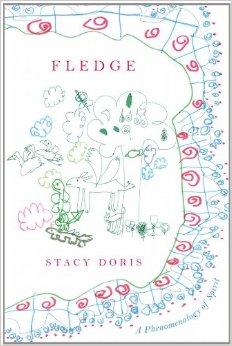by Jenifer Dorsey
193765804X, paper. 90 pp.
Nightboat Books 2012
Judging this book by its cover, one might call Stacy Doris’ posthumous poetry collection whimsical. The white cover with childlike outline drawings of foliage, birds and beasts, as well as the name, evoke innocence and the imaginative. Opening it up and reading its first lines, one learns that Fledge: A Phenomenology of Spirit is “a log of disasters,” a register of miracle,” and “a bunch of love poems of undying love.” It is a book filled with “six-syllable lines” and “mostly no two-syllable words.” Within this stripped down structure lurks complexity. Playful words like “shine,” “slide” or “smeared jam,” seem an allusion to nostalgia at a time when love complicates life. For instance, Doris writes, “To sink to a field warm/not dragonfly where if/hung there can you get to/ask everything to ask/for both? If not or stilled/can you get everything/save for both in asked where/the rope of me by me,” and captures the simultaneous experience that is the desperation to hold onto what one loves and the desire to escape it. These poems capture what happens to the spirit when autonomous beings intertwine. As Doris writes, “[…] Play ends when two/shapes are forced to match, drop.” While the whimsy is indeed contained within these playful, musical poems, it is weighted by the grown-up reality that is love, a la “I want what you want in/your want of it, but what/we want isn’t the same.”
Stacy Doris (1962–2012) has been called “a poet eager to fly in the face of convention always with the most delicate of manners.” Born in Bridgeport, Connecticut, she received a BA in literature and society from Brown University and an MFA in English and creative writing from the University of Iowa. Her work includes poetry, short stories and translations from French and Spanish. She taught at the University of Iowa and San Francisco State University, among other institutions. Fledge: A Phenomenology of Spirit was her final book.
Somatic Book Review
To read this book, find a whimsically simple place—a spot of grass, a porch swing, a hammock, a creek shore, a rocky overlook atop a mountain. Inhale. Begin. Begin to appreciate the complexity within the stripped down. And in it become a student of the spirit—yours, Stacy Doris’, the slice of world in which you sit and study a “book of six-syllable lines” containing “mostly no two-syllable words.” Can you feel their rhythm, taking you both away from and deeper into place?
“To sink to a field warm/not dragonfly where if/hung
there can you get to/ask everything to ask/for both?
If not or stilled/can you get everything/save for both
in asked where/the rope of me by me” writes Doris
on page 58.
Close your eyes. Are you there? Sinking into it with the sun upon your face? Where is your consciousness now? Ascend the layers. Descend them. Read out loud. Listen to hear if someone reads back. Complicate things with another voice. Where do you feel the conflict in your body? The resolution? Does it resonate? Is there desire? Dissolution? These are, writes Doris, “a bunch of love poems of undying love.”
“I want what you want in/your want of it, but what/we
want isn’t the same./A strain of rows then, us/thread
so we determine/I’ll take everything you/slurp up the
drip offs, plus/you can watch. Everything/means
wraps and envelopes,/you get the productions,/gloss
pocks of minerals”
As your recite them aloud to the spirit surrounding or silently read them to the spirit internal, act out her playful words. Slide. Rumble. Squat. Grow. Shine. Watch. Leave. Arrive. At higher consciousness. Become one.
Reviewer: Jenifer Kay Dorsey holds a BA in Journalism from Columbia College Chicago and an MFA in Writing & Poetics from the Jack Kerouac School of Disembodied Poetics at Naropa University. She was Bombay Gin Literary Journal’s Distribution and Managing Editor.


